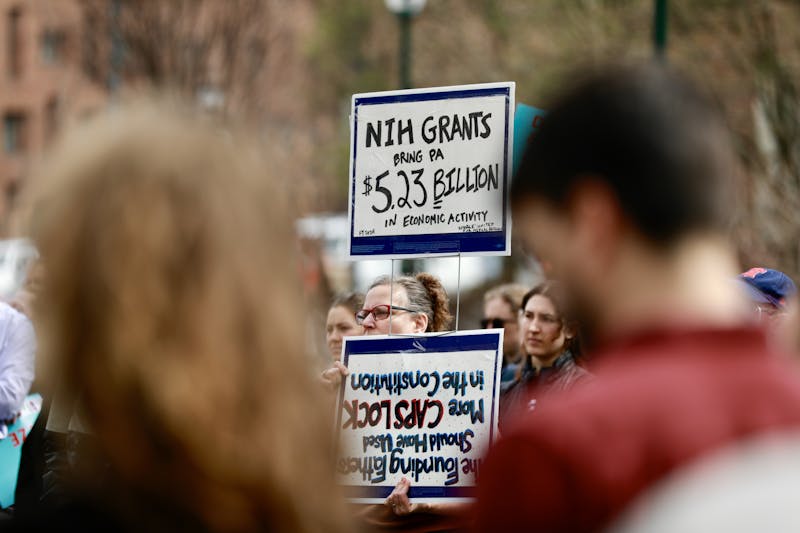Princeton's Judson Wallace sat on the bench looking dejected. He couldn't believe what he had just seen. Neither could I.
At the other end of the floor, Penn's Eric Osmundson had just sunk a pair of free-throws to tie the game at 56 with seconds remaining. The Quakers would go on to make quick work of their New Jersey basketball nemesis in overtime.
Princeton had folded, and Penn had completed one of the most spectacular comebacks in recent memory. The tide turned midway through the second half, and the Quakers rallied from an 18-point deficit -- against the Princeton offense, no less. It was just the latest chapter in the storied rivalry that has carried on for more than a century. And this chapter will be one people tell stories about for years to come.
Tuesday night at the Palestra was a textbook example of what a college basketball rivalry is all about. There were 8,000 fans on their feet as Ibby Jaaber added the first points in overtime to give Penn a lead for the first time all night. There were students. There were alumni, young and old, some who had traveled great distances just for the game. There was Penn President, and former Princeton Provost, Amy Gutmann -- at least she's on the right side now. There was Pennsylvania Governor Ed Rendell, who has always been a staunch supporter of the Red and Blue. And in the back rows of the arena there were Philadelphians who had no connection with the universities, other than they wanted to see a classic basketball game in the classic basketball venue.
That's the spirit of the rivalry game. People show up because it matters. There is an awful lot of pride at stake when Penn and Princeton get together, as much as the orange- and black-clad fans might not want to admit it.
But what makes this game different from some of the other more widely touted matchups, such as the Tobacco Road Rivalry between Duke and North Carolina or the Border War between Kansas and Missouri, is how much it matters to both teams. The Ivy League is not the ACC or Big 12. It has one and only one bid to the NCAA Tournament. For 43 of the last 50 years, it has either been Penn or Princeton that carried the Ivy banner to the postseason. One of the two superpowers moves on, and the other goes home.
Carolina had nothing to lose last night in Durham. They will make it to the Tournament, and so will Duke. Kansas too is a lock for March Madness. More than anything else, these marquee games that ESPN has built its "Rivalry Week" around are just about bragging rights. That being the case, it would be a nice gesture for the network to come back to college basketball's most historic gym -- they covered Villanova-Saint Joseph's Monday night -- for the Palestra's best rivalry: Penn-Princeton.
TV execs, it seems, are averse to putting Ivy League teams in the spotlight, with the possible exception of the annual Princeton-Duke contest. But why should they be? There are certainly plenty of Ivy League alumni across the country -- and most of them fit conveniently into highly coveted demographic groups. And it wouldn't hurt to have some variety of teams on from time to time -- I've seen enough Kentucky for a lifetime.
Maybe if Penn-Princeton got a little more national attention, it would gain respect as a rivalry outside of the Northeast Corridor. Maybe then commentators such as ESPN's John Anderson would have something more intelligent to say than "Gee, Princeton, you're supposed to be smarter than that," after watching the Tigers' second-half lead disappear. To them, Ivy League basketball is an unknown commodity. It does not have the glitz and glamour of the ACC or the Big East. But what it does have is Penn and Princeton.
Try telling the players or the coaches or the fans that their game is not important because the jerseys do not say "Kansas" or "Connecticut." They won't believe you. On the court, or in the seats, it's all the same; it's a battle. People do not refer to games against Cornell as "Black Tuesday." That title is reserved for a certain game against Princeton that many of us would like to forget. I'm sure that in time Tuesday night's game will have a name of its own.
That's why we have rivalries. That's why places like the Palestra exist. And that's why everyone should take advantage of the opportunity to be a part of it.
Oh, and Judson, that offensive foul was a good call.
Jeff Shafer is a junior marketing and management concentrator from Columbia Falls, Mont., and Editorial Page Editor-Elect of The Daily Pennsylvanian. Par for the Course appears on alternate Thursdays.
The Daily Pennsylvanian is an independent, student-run newspaper. Please consider making a donation to support the coverage that shapes the University. Your generosity ensures a future of strong journalism at Penn.
DonatePlease note All comments are eligible for publication in The Daily Pennsylvanian.







